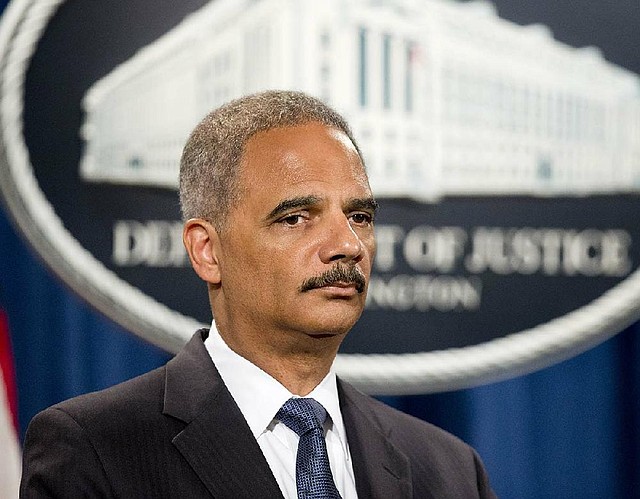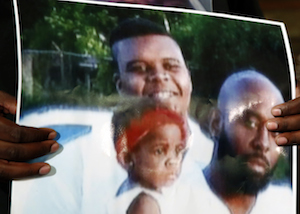Ferguson to be 'transparent,' U.S. hears
Bias probe in teen’s killing draws words of welcome from police, his family
Attorney General Eric Holder takes questions Thursday in Washington during a news conference announcing a broad investigation into the Ferguson, Mo., police operations.
Friday, September 5, 2014
FERGUSON, Mo. -- Authorities in Ferguson are pledging their full cooperation with a federal civil-rights investigation into their Police Department after the shooting last month of an unarmed black 18-year-old by a white police officer.
Officials in Ferguson, in a statement, said they had met with Justice Department officials "and feel our collaborative efforts are another step forward in showing our willingness to be transparent and forthright as we continue the process of earning back the trust of our residents and our neighbors in the St. Louis region."
The investigation, which goes beyond an existing federal probe into the Aug. 9 shooting of Michael Brown, will look for patterns of discrimination within the predominantly white department and focus on how officers use force, search and arrest suspects, and treat inmates at the city jail.
In announcing the action, Attorney General Eric Holder, who visited the St. Louis suburb two weeks ago, said he and his department had heard numerous concerns from people there about police practices, a history of "deep mistrust" of law enforcement and a lack of diversity on the police force.
Besides the investigation into the Ferguson police force, the Justice Department said it will also work with the St. Louis County Police Department, which trains officers from Ferguson and other local departments, to review the use of force, the handling of mass demonstrations and other aspects of policing.
It also will produce a report on the county's response to the two weeks of sometimes violent demonstrations that followed the shooting.
St. Louis County Police Chief Jon Belmar welcomed the review, saying: "The most effective way to ensure we adhere to our own rigorous standards of performance is to have an objective party review our operations on a regular basis. I welcome any process that improves the department."
Brown's family also offered support for the federal investigation.
"We believe that transparency in law enforcement is the only way to build trust in the community, not just in the killing of Michael Brown, but for others who have suffered as well," Benjamin Crump, a lawyer representing the family, said in a statement.
Police have said the shooting happened after a scuffle that broke out after officer Darren Wilson told Brown and a friend to move out of the street to a sidewalk.
Police say Wilson was pushed into his squad car and physically assaulted. Some witnesses have reported seeing Brown's arms in the air before the shooting in an act of surrender. An autopsy paid for by Brown's family concluded that he was shot six times, twice in the head.
The FBI is conducting a civil-rights investigatio, and a county grand jury also is evaluating the case.
The investigation announced Thursday will focus on a Police Department that is predominantly white, even though Ferguson is about 70 percent black. .
A 2013 report by the Missouri attorney general's office found that Ferguson police stopped and arrested black drivers nearly twice as often as white motorists but were also less likely to find contraband among the black drivers.
Sen. Claire McCaskill, D-Mo., called the investigation "a step in the right direction." Civil-rights advocates championed the move, too, but said more needs to be done.
"On a national level, we will remain steadfast in our commitment to eliminate police brutality everywhere and ensure the rights of those most impacted by these practices are protected in their entirety," said Tef Poe, a St. Louis artist and organizer with the group HandsUpUnited.
The inquiry is part of a broader Justice Department effort to investigate troubled police departments and, when pervasive problems are found, institute changes.
The investigations typically encourage significant changes to policies and practices and often end with settlements known as consent decrees in which the department agrees to make specified changes. The department says it is currently enforcing 14 agreements to overhaul police department practices.
Information for this article was contributed by Eric Tucker of The Associated Press; by Matt Apuzzo and Manny Fernandez of The New York Times; and by Richard A. Serrano and Timothy M. Phelps of the Tribune Washington Bureau.
A Section on 09/05/2014

